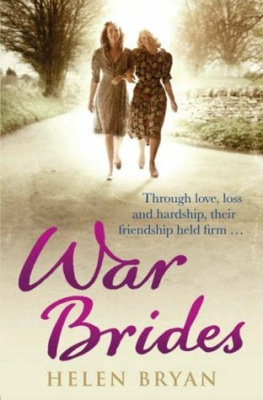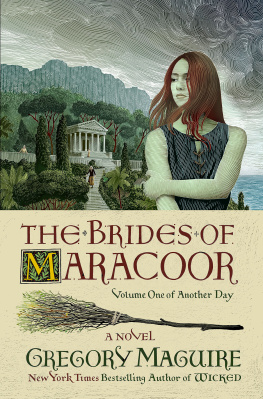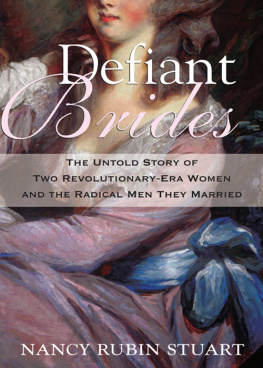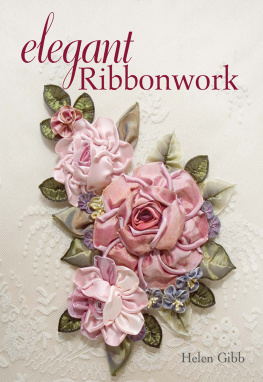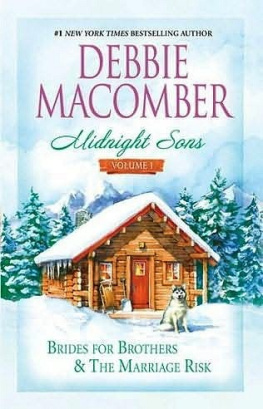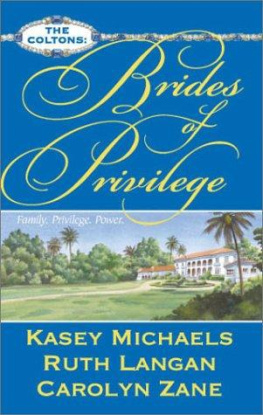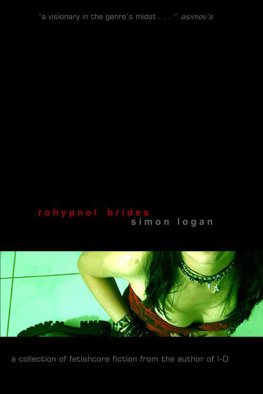Helen Bryan - War Brides
Here you can read online Helen Bryan - War Brides full text of the book (entire story) in english for free. Download pdf and epub, get meaning, cover and reviews about this ebook. year: 2008, publisher: Dales Large Print Books, genre: Science fiction. Description of the work, (preface) as well as reviews are available. Best literature library LitArk.com created for fans of good reading and offers a wide selection of genres:
Romance novel
Science fiction
Adventure
Detective
Science
History
Home and family
Prose
Art
Politics
Computer
Non-fiction
Religion
Business
Children
Humor
Choose a favorite category and find really read worthwhile books. Enjoy immersion in the world of imagination, feel the emotions of the characters or learn something new for yourself, make an fascinating discovery.
- Book:War Brides
- Author:
- Publisher:Dales Large Print Books
- Genre:
- Year:2008
- Rating:3 / 5
- Favourites:Add to favourites
- Your mark:
- 60
- 1
- 2
- 3
- 4
- 5
War Brides: summary, description and annotation
We offer to read an annotation, description, summary or preface (depends on what the author of the book "War Brides" wrote himself). If you haven't found the necessary information about the book — write in the comments, we will try to find it.
War Brides — read online for free the complete book (whole text) full work
Below is the text of the book, divided by pages. System saving the place of the last page read, allows you to conveniently read the book "War Brides" online for free, without having to search again every time where you left off. Put a bookmark, and you can go to the page where you finished reading at any time.
Font size:
Interval:
Bookmark:
WAR BRIDES
HELEN BRYAN
Copyright Helen Bryan 2007
All rights reserved
The moral right of the author has been asserted
This book is dedicated, as always, with love to Roger, Cassell, Michelle, and Niels,
And now to darling Bo and Poppy too
Acknowledgements
A book has a long, long journey from the first glimmer of an idea in the authors mind to the finished product, and I am grateful to many people who helped War Brides along. First of all, I want to thank my agent Kathryn Green of the Kathryn Green Literary Agenc in New York for her encouragement and support.
Naturally, the author believes in the book she is writing, but sooner or later someone else has to believe in it too, or the whole exercise becomes discouragingly pointless. I was fortunate that someone with Kathryns experience in publishing liked the War Brides as much as I did, was undaunted by the books length or the complexity of overlapping stories, and never once suggested simplifying. I am grateful for her help in focussing the book without losing anything essential.
It has been a pleasure to know and work with everyone with whom Ive come into contact with at Michael Joseph. Louise Moore-then Commissioning Editor, now Managing Director-makes authors glow with the warmth of her enthusiasm, and her own passion for history informs any discussion of historical fiction. Editor Clair Ledingham refined the book with painstaking care, and a sure touch. Copy Editor Hazel Orme perfected it with equally painstaking care and precision. We discovered a shared appreciation for pre-war elegance-the hats, the gloves, the dressing cases-and I am grateful for her practical input on several wartime topics, not least her expert advice on the best method of catching escaped bulls. Thanks are due to Clare Bord for keeping everything on track, seeing manuscripts went to the right people and generally making sure that what was meant to happen, happened.
All the characters in this book are my own inventions and, with the exception of Manfred are not based on any actual person. Any factual errors in the book are not the fault of the publishers but are mine alone.
No acknowledgement of the help I received would be complete without saying thank you to H. Jassim and his brother Sirwan Jassim, resident geniuses of BJ
Computers in Camden Town. They have made innumerable house calls to rescue the computer, the manuscript, and me from technological crises and meltdown, and I have had many occasions to be grateful for their expertise, patience and good humour. Without them the book would have disappeared into cyber space.
Finally, when I am barricaded in my study muttering distractedly to imaginary characters, directing them this way and that in imaginary situations, my family, who despite busy lives, are never too occupied to be supportive or show an interest in my efforts, are a constant reminder of real life going on outside my study door, better than anything I can make up.
Introduction
WAR BRIDES probably began to take shape long before I was aware of it. I was one of the post-war baby-boom generation whose early years were touched, though in my case gently, by the wars long shadow. My husband and I both had fathers who served in the US Army, as did all our uncles except for one in the Navy and one who became an Air Force pilot. But women played an active role too. An aunt by marriage was an Army nurse, and my own mother was an officer in WAVES, Women Accepted for Volunteer Emergency Service. As a child, I was fascinated to learn that my respectable mother, a housewife and Sunday-school teacher, had once worn a pistol on her hip-one she had been trained to shoot if necessary - as she escorted telegrams and urgent communications across Norfolk Navy Yard. Because my husbands father was posted to Europe shortly before my husband was born, my mother-in-law gave birth in a military base hospital in Alabama, far from anyone she knew, and then made a long arduous journey home to her family in Wisconsin, struggling with a screaming baby on a series of trains packed with soldiers. Stories of how anxious families at home waited and coped with everyday life, living for letters and working extra hard, were part and parcel of our childhoods as much as the family photographs of relatives in uniform displayed in every sitting room.
As a bride in 1944, my mother had walked down the aisle of her local Episcopal church wearing bedroom slippers beneath her satin bridal dress. Pretty louche behavior by the normal standards of her small Virginia hometown, but shoes were rationed and that was what brides did then. But everyone had enough to eat despite the rationing imposed by the US government, and the European war was far enough away to make a German invasion seem unlikely. It was only later, when I studied history, that I learned more about the war and its horrors, the grim and terrifying realities, hardships and privations faced by people across Europe and Russia. When I moved to England to live, I began to grasp first hand the impact of this terrible period, how dark and long a shadow it had left. I had lived in London for years by the time an American acquaintance visited shortly before the fiftieth anniversary of Victory in Europe Day, the same occasion the war brides commemorate in this book. Our acquaintance dutifully visited the Imperial War Museum, Churchills War Rooms, and Eisenhowers underground headquarters. By the end of the day he was deeply affected by what he had seen and learned. He emerged into the light of day to say he wanted to shake the hand of every English person he saw over the age of sixty. After researching this book, I know what he meant.
In households I knew as a child, family photographs of uniformed men and women were gradually consigned to closets and drawers to make way for wedding pictures and photos of new babies and schoolchildren, teenagers in prom dress. But the older generation still told their stories and I began to add to what I already knew about how women had coped in the war, not sure at first what I would do with this information. The preoccupations that women of any period share falling in love, marriage, looking after husbands and families, struggling to make ends meet or forced by circumstances into widow or spinsterhood-remained the same as the war engulfed everybody. In terrible times, and despite the heavy added burdens of war work, rationing, and the threat of invasion, many women fought a personal battle for some kind of normality, with the kind of determined courage never mentioned in the history books.
And in England the war loomed larger in the background than it had in the United States. Older English people I met all had stories about the war and would reminisce at the drop of a hat. Before long Elsie, Frances, Alice, Tanni and Evangeline were hovering, wraithlike, waiting for the right setting to come to life. When our family spent several summers renting a pleasant cottage callSmugglers in a Sussex village that featured an old church reputed to have a smugglers tunnel connecting the churchyard to the seacoast, that was it. The five young women soon emerged fully fledged characters, impatient for their stories to be written. But I still neededsomething.
I discovered it in the fictional character code-named Manfred, based on a real and dangerous Nazi collaborator living in wartime England, certainly dead now, and whose true identity will probably never be known. The person who told me about him or her-was an older family friend who had escaped the Nazis in Europe to serve in British Intelligence during the war. It was he who prompted me to ask the seminal question that begins any good novel: what if?
John was a deeply civilized, kind and intelligent man, with a lively sense of humor, but to his dying day he recalled with great bitterness the person who, Intelligence knew, was sending vital weather reports to the Luftwaffe on the French coast, alerting them to forecasts of clear weather over England. In the days before radar, this was invaluable information for bomber pilots, who depended on visibility, and advance knowledge of good weather assisted German bombing of England, bombing intended, and indeed, expected by many in England, to pave the way for a German invasion. That the traitor, spy or collaborator who facilitated the death and destruction of the Blitz was never caught and brought to justice after the war always rankled John, and made me wonder about the wars deep scars and unsettled scores, and their long term effects.
Next pageFont size:
Interval:
Bookmark:
Similar books «War Brides»
Look at similar books to War Brides. We have selected literature similar in name and meaning in the hope of providing readers with more options to find new, interesting, not yet read works.
Discussion, reviews of the book War Brides and just readers' own opinions. Leave your comments, write what you think about the work, its meaning or the main characters. Specify what exactly you liked and what you didn't like, and why you think so.

